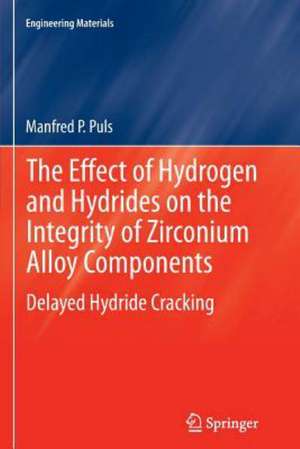The Effect of Hydrogen and Hydrides on the Integrity of Zirconium Alloy Components: Delayed Hydride Cracking: Engineering Materials
Autor Manfred P. Pulsen Limba Engleză Paperback – 20 sep 2014
This up-to-date reference focuses on documented research surrounding DHC, including current methodologies for design and assessment of the results of periodic in-service inspections of pressure tubes in nuclear reactors. Emphasis is placed on showing how our understanding of DHC is supported by progress in general understanding of such broad fields as the study of hysteresis associated with first order phase transformations, phase relationships in coherent crystalline metallic solids, the physics of point and line defects, diffusion of substitutional and interstitial atoms in crystalline solids, and continuum fracture and solid mechanics. Furthermore, an account of current methodologies is given illustrating how such understanding of hydrogen, hydrides and DHC in zirconium alloys underpins these methodologies for assessments of real life cases in the Canadian nuclear industry.
The all-encompassing approach makes The Effect of Hydrogen and Hydrides on the Integrity of Zirconium Alloy Component: Delayed Hydride Cracking an ideal reference source for students, researchers and industry professionals alike.
| Toate formatele și edițiile | Preț | Express |
|---|---|---|
| Paperback (1) | 953.35 lei 6-8 săpt. | |
| SPRINGER LONDON – 20 sep 2014 | 953.35 lei 6-8 săpt. | |
| Hardback (1) | 957.75 lei 6-8 săpt. | |
| SPRINGER LONDON – 4 aug 2012 | 957.75 lei 6-8 săpt. |
Din seria Engineering Materials
- 18%
 Preț: 1390.89 lei
Preț: 1390.89 lei - 18%
 Preț: 891.33 lei
Preț: 891.33 lei - 15%
 Preț: 703.85 lei
Preț: 703.85 lei - 18%
 Preț: 892.90 lei
Preț: 892.90 lei - 20%
 Preț: 573.70 lei
Preț: 573.70 lei - 24%
 Preț: 829.34 lei
Preț: 829.34 lei -
 Preț: 343.98 lei
Preț: 343.98 lei - 18%
 Preț: 1001.02 lei
Preț: 1001.02 lei - 18%
 Preț: 1396.43 lei
Preț: 1396.43 lei - 18%
 Preț: 946.55 lei
Preț: 946.55 lei - 18%
 Preț: 1120.99 lei
Preț: 1120.99 lei - 18%
 Preț: 1384.75 lei
Preț: 1384.75 lei - 18%
 Preț: 1236.99 lei
Preț: 1236.99 lei - 17%
 Preț: 490.22 lei
Preț: 490.22 lei - 15%
 Preț: 658.05 lei
Preț: 658.05 lei - 18%
 Preț: 1106.00 lei
Preț: 1106.00 lei - 18%
 Preț: 1101.26 lei
Preț: 1101.26 lei - 18%
 Preț: 1111.85 lei
Preț: 1111.85 lei - 18%
 Preț: 1002.61 lei
Preț: 1002.61 lei - 18%
 Preț: 889.75 lei
Preț: 889.75 lei - 18%
 Preț: 997.09 lei
Preț: 997.09 lei - 17%
 Preț: 428.09 lei
Preț: 428.09 lei - 15%
 Preț: 644.95 lei
Preț: 644.95 lei -
 Preț: 388.44 lei
Preț: 388.44 lei - 20%
 Preț: 566.85 lei
Preț: 566.85 lei - 18%
 Preț: 949.42 lei
Preț: 949.42 lei - 15%
 Preț: 631.72 lei
Preț: 631.72 lei - 15%
 Preț: 640.88 lei
Preț: 640.88 lei - 15%
 Preț: 635.47 lei
Preț: 635.47 lei - 18%
 Preț: 1233.20 lei
Preț: 1233.20 lei - 18%
 Preț: 1548.11 lei
Preț: 1548.11 lei - 18%
 Preț: 1126.03 lei
Preț: 1126.03 lei - 15%
 Preț: 638.11 lei
Preț: 638.11 lei - 15%
 Preț: 637.46 lei
Preț: 637.46 lei - 18%
 Preț: 1217.10 lei
Preț: 1217.10 lei - 18%
 Preț: 945.62 lei
Preț: 945.62 lei - 18%
 Preț: 948.61 lei
Preț: 948.61 lei - 18%
 Preț: 1224.54 lei
Preț: 1224.54 lei -
 Preț: 367.93 lei
Preț: 367.93 lei - 15%
 Preț: 639.25 lei
Preț: 639.25 lei - 15%
 Preț: 643.34 lei
Preț: 643.34 lei - 18%
 Preț: 955.08 lei
Preț: 955.08 lei - 15%
 Preț: 645.79 lei
Preț: 645.79 lei - 18%
 Preț: 1237.30 lei
Preț: 1237.30 lei - 18%
 Preț: 1114.34 lei
Preț: 1114.34 lei - 18%
 Preț: 1217.10 lei
Preț: 1217.10 lei - 15%
 Preț: 651.19 lei
Preț: 651.19 lei
Preț: 953.35 lei
Preț vechi: 1162.61 lei
-18% Nou
Puncte Express: 1430
Preț estimativ în valută:
182.47€ • 189.78$ • 152.91£
182.47€ • 189.78$ • 152.91£
Carte tipărită la comandă
Livrare economică 13-27 martie
Preluare comenzi: 021 569.72.76
Specificații
ISBN-13: 9781447159773
ISBN-10: 1447159772
Pagini: 484
Ilustrații: XXXII, 452 p.
Dimensiuni: 155 x 235 x 25 mm
Greutate: 0.67 kg
Ediția:2012
Editura: SPRINGER LONDON
Colecția Springer
Seria Engineering Materials
Locul publicării:London, United Kingdom
ISBN-10: 1447159772
Pagini: 484
Ilustrații: XXXII, 452 p.
Dimensiuni: 155 x 235 x 25 mm
Greutate: 0.67 kg
Ediția:2012
Editura: SPRINGER LONDON
Colecția Springer
Seria Engineering Materials
Locul publicării:London, United Kingdom
Public țintă
ResearchCuprins
Preface.- 1.Introduction.- 2.Properties of Bulk Zirconium Hydrides.- 3. Hydride Phases, Orientation Relationships, Habit Planes and Morphologies.- 4. Solubility of Hydrogen.- 5. Diffusion of Hydrogen- 6. Characteristics of the Solvus.- 7. Theories of Coherent Phase Equilibrium.- 8. Experimental Results and Theoretical Interpretations of Solvus Relationships in the Zr-H System.- 9. Fracture Strength of Embedded Hydride Precipitates in Zirconium and its Alloys.- 10 Delayed Hydride Cracking – Theory and Experiment.- 11 DHC Initiation at Volumetric Flaws.- 12. Applications to CANDU Reactors
Notă biografică
Manfred Puls is a consultant, working through MPP Consulting with Kinectrics Inc. in support of research conducted for the Canadian nuclear industry. He holds a PhD degree in Physics from McMaster University, Hamilton, Ontario, Canada, and has engineering degrees from the University of British Columbia, Vancouver, B.C., Canada. He has been working in the nuclear industry since 1971. Before moving into his present consulting role, Dr Puls had a long career with AECL, working as Research Scientist, Section Head, Manager and Program Manager during his 35 year stay with this organization.
Textul de pe ultima copertă
By drawing together the current theoretical and experimental understanding of the phenomena of delayed hydride cracking (DHC) in zirconium alloys, The Effect of Hydrogen and Hydrides on the Integrity of Zirconium Alloy Components: Delayed Hydride Cracking provides a detailed explanation focusing on the properties of hydrogen and hydrides in these alloys. Whilst the focus lies on zirconium alloys, the combination of both the empirical and mechanistic approaches creates a solid understanding that can also be applied to other hydride forming metals.
This up-to-date reference focuses on documented research surrounding DHC, including current methodologies for design and assessment of the results of periodic in-service inspections of pressure tubes in nuclear reactors. Emphasis is placed on showing that our understanding of DHC is supported by progress across a broad range of fields. These include hysteresis associated with first-order phase transformations; phase relationships in coherent crystalline metallic solids; diffusion of substitutional and interstitial atoms in crystalline solids; and continuum fracture and solid mechanics. Furthermore, an account of current methodologies is given, illustrating how such understanding of hydrogen, hydrides and DHC in zirconium alloys underpins these methodologies for assessments of real life cases in the Canadian nuclear industry.
The all-encompassing approach makes The Effect of Hydrogen and Hydrides on the Integrity of Zirconium Alloy Component: Delayed Hydride Cracking an ideal reference source for students, researchers and industry professionals alike.
This up-to-date reference focuses on documented research surrounding DHC, including current methodologies for design and assessment of the results of periodic in-service inspections of pressure tubes in nuclear reactors. Emphasis is placed on showing that our understanding of DHC is supported by progress across a broad range of fields. These include hysteresis associated with first-order phase transformations; phase relationships in coherent crystalline metallic solids; diffusion of substitutional and interstitial atoms in crystalline solids; and continuum fracture and solid mechanics. Furthermore, an account of current methodologies is given, illustrating how such understanding of hydrogen, hydrides and DHC in zirconium alloys underpins these methodologies for assessments of real life cases in the Canadian nuclear industry.
The all-encompassing approach makes The Effect of Hydrogen and Hydrides on the Integrity of Zirconium Alloy Component: Delayed Hydride Cracking an ideal reference source for students, researchers and industry professionals alike.
Caracteristici
Gives a coherent, detailed account of the physics of delayed hydrogen cracking Provides a reference source for research conducted on the effect of hydrogen and hydrides on the mechanical properties of zirconium alloys Provides an account of how the current methodology for the design and periodic assessment of in-service pressure tubes is underpinned by the foregoing results and understanding Includes supplementary material: sn.pub/extras Includes supplementary material: sn.pub/extras








